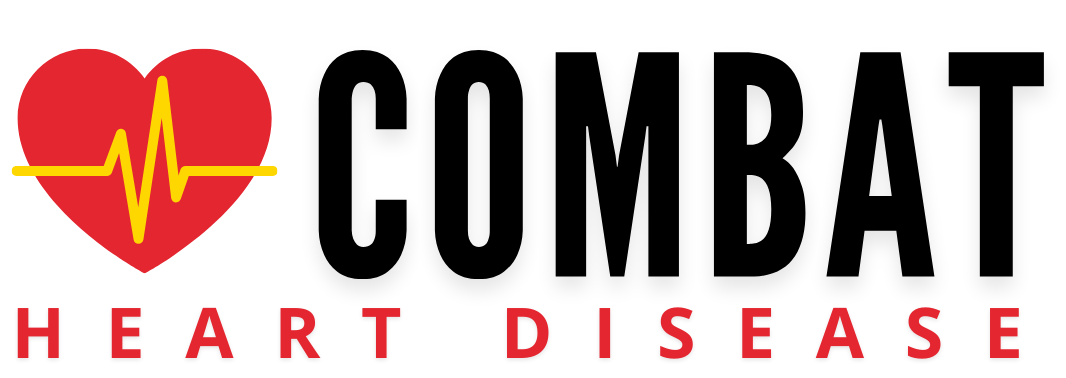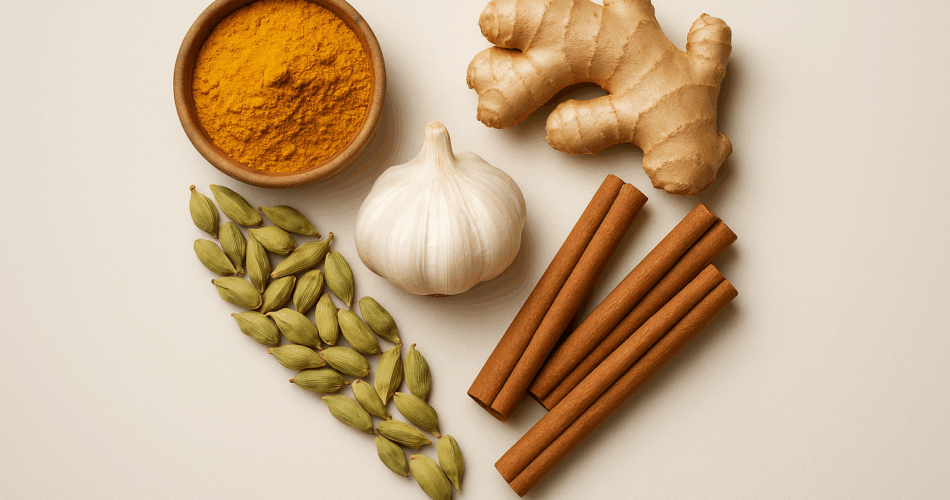Introduction: The Hidden Power of Ancient Spices
For centuries, ancient cultures relied on natural herbs and spices to treat ailments long before modern medicine existed. Today, scientific research continues to confirm what our ancestors already knew — certain spices contain compounds that can improve heart health, reduce inflammation, and even help clean clogged arteries naturally.
The modern diet, high in saturated fats and processed foods, contributes to plaque buildup in the arteries — the silent cause behind millions of heart disease cases. Fortunately, nature offers powerful solutions in the form of ancient spices that not only enhance flavor but also protect and rejuvenate the cardiovascular system.
Why Arterial Health Matters
Your arteries are like the highways of your body, carrying oxygen-rich blood to every organ. When plaque — a sticky mix of cholesterol, fat, and calcium — accumulates inside, it narrows these pathways, slowing blood flow. Over time, this can lead to heart attacks, strokes, or peripheral artery disease.
Understanding Arterial Plaque and Its Dangers
Arterial plaque formation begins quietly. As inflammation and oxidative stress damage arterial walls, cholesterol deposits attach, forming hard plaques. Left unchecked, they can rupture, causing dangerous blood clots.
How Natural Remedies Support Cardiovascular Health
Natural spices contain bioactive compounds that:
- Reduce inflammation
- Improve lipid metabolism
- Prevent LDL oxidation
- Enhance blood circulation
- Lower blood pressure naturally
Let’s explore five time-tested spices known for their ability to keep arteries clear and the heart strong.
1. Turmeric — The Golden Healer
Key Active Compound: Curcumin
Turmeric, often called the “Golden Spice of Life,” is one of the most powerful natural anti-inflammatories. The key compound, curcumin, helps protect the endothelium (inner lining of the blood vessels) from damage caused by oxidative stress.
How Turmeric Helps Clean Arteries
Curcumin supports heart health by:
- Reducing inflammation in blood vessels
- Preventing LDL cholesterol oxidation
- Improving endothelial function
- Enhancing nitric oxide production, aiding better blood flow
“A 2017 study in the Journal of Nutrition & Metabolism found that daily turmeric supplementation significantly reduced arterial stiffness in middle-aged adults.”
Pros and Cons of Turmeric
Pros:
- Natural anti-inflammatory
- Supports circulation
- Fights oxidative stress
- Aids cholesterol balance
Cons:
- May cause mild stomach upset in large doses
- Can interact with blood-thinning medications
2. Ginger — Nature’s Anti-Inflammatory Root
Ginger has been used for over 5,000 years as both food and medicine. Its active compound, gingerol, delivers strong antioxidant and anti-inflammatory properties that make it a potent heart protector.
How Ginger Improves Circulation
Ginger promotes better blood flow by:
- Preventing platelet aggregation (clumping)
- Reducing LDL cholesterol
- Improving arterial flexibility
- Enhancing fat metabolism
A study published in the Journal of Nutrition found that regular ginger intake can lower total cholesterol by up to 17% in just 45 days.
Pros and Cons of Ginger
Pros:
- Boosts circulation
- Reduces cholesterol and triglycerides
- Helps lower blood pressure
- Easy to add to food or tea
Cons:
- May cause heartburn in some people
- Can thin blood if combined with medication
3. Garlic — The Ancient Heart Protector
Garlic has been revered in Egyptian, Greek, and Indian medicine for centuries. Its power lies in allicin, a sulfur compound released when garlic is crushed or chopped.
Allicin: The Natural Compound That Lowers Cholesterol
Garlic helps prevent plaque buildup by:
- Lowering total and LDL cholesterol levels
- Reducing blood pressure
- Preventing arterial calcification
- Improving overall vascular elasticity
In fact, research published in the Journal of Nutrition shows that aged garlic extract can reduce arterial plaque by up to 40% in 90 days.
Pros and Cons of Garlic
Pros:
- Scientifically proven to reduce plaque
- Supports immune health
- Helps lower blood pressure
Cons:
- Strong odor may be unpleasant
- May irritate the stomach when raw
4. Cinnamon — The Sweet Spice With Artery-Clearing Power
Cinnamon isn’t just a kitchen staple; it’s a medicinal powerhouse. Rich in antioxidants and anti-diabetic compounds, it helps regulate both blood sugar and lipid levels — two key factors in arterial health.
How Cinnamon Regulates Blood Sugar and Lipids
Cinnamon aids the heart by:
- Lowering LDL cholesterol and triglycerides
- Reducing fasting blood sugar
- Enhancing circulation
- Preventing oxidative damage to arteries
A 2019 meta-analysis in Clinical Nutrition concluded that cinnamon supplementation improved lipid profiles and reduced inflammation markers in type 2 diabetic patients.
Pros and Cons of Cinnamon
Pros:
- Reduces blood sugar spikes
- Balances cholesterol levels
- Fights inflammation
Cons:
- Cassia cinnamon may contain coumarin, which can be toxic in high doses
- Ceylon cinnamon is safer for long-term use
5. Cardamom — The Detoxifying Spice
Known as the “Queen of Spices,” cardamom offers impressive cardiovascular benefits due to its antioxidant and diuretic properties. It’s been used in Ayurvedic medicine to cleanse the blood and improve heart function.
How Cardamom Supports Blood Flow and Heart Function
Cardamom aids artery cleansing by:
- Reducing blood pressure through diuretic effects
- Improving circulation
- Combating oxidative stress
- Supporting detoxification of harmful substances
In a 2012 study published in Indian Journal of Biochemistry & Biophysics, cardamom supplementation improved antioxidant status and lowered blood pressure in adults with hypertension.
Pros and Cons of Cardamom
Pros:
- Powerful antioxidant and detoxifier
- Naturally lowers blood pressure
- Pleasant aroma and flavor
Cons:
- May be costly compared to other spices
- Rare allergic reactions in sensitive individuals
How to Incorporate These Spices Into Your Daily Diet
You don’t need to overhaul your meals to enjoy these benefits. Small, consistent doses make the biggest impact.
Simple Recipes and Practical Tips
- Morning: Mix turmeric and ginger in warm lemon water.
- Lunch: Add garlic and cinnamon to stir-fries or soups.
- Dinner: Sprinkle cardamom in curries or herbal teas.
- Snack: Use cinnamon and turmeric in roasted nuts or smoothies.
“Think of your kitchen as a natural pharmacy — every pinch of spice is a step toward cleaner arteries.”
The Scientific Evidence Behind Spice-Based Heart Protection
- Turmeric: Reduces arterial stiffness and inflammation (Journal of Nutrition & Metabolism, 2017)
- Ginger: Lowers cholesterol and triglycerides (Journal of Nutrition, 2018)
- Garlic: Shrinks arterial plaque by 40% (Journal of Nutrition, 2016)
- Cinnamon: Improves lipid profile and insulin sensitivity (Clinical Nutrition, 2019)
- Cardamom: Reduces blood pressure naturally (Indian Journal of Biochemistry & Biophysics, 2012)
Lifestyle Tips for Better Arterial Health
Natural remedies work best when combined with a heart-friendly lifestyle:
- Eat more plant-based foods rich in fiber and antioxidants
- Stay active — aim for 30 minutes of movement daily
- Avoid smoking and excessive alcohol
- Manage stress through breathing or mindfulness
- Get regular check-ups to track blood pressure and cholesterol
Final Thoughts: Reviving Ancient Wisdom for a Healthier Heart
The wisdom of ancient civilizations still holds value today. Spices like turmeric, garlic, and cinnamon aren’t just flavor enhancers — they’re nature’s own cardiovascular protectors. By adding them to your daily meals, you can support cleaner arteries, better circulation, and a stronger heart — naturally and safely.
“Let food be thy medicine, and medicine be thy food.” — Hippocrates
Small daily choices, like seasoning with these ancient spices, can lead to big changes in heart health over time.
FAQs
1. How long does it take for these spices to show results?
Most studies show improvements in blood markers within 8–12 weeks of consistent use.
2. Can I take supplements instead of whole spices?
Yes, but it’s best to consult your healthcare provider for dosage and quality assurance.
3. Which spice is most effective for lowering cholesterol?
Garlic and turmeric show the strongest cholesterol-reducing effects in scientific studies.
4. Can I combine all these spices daily?
Absolutely — combining them enhances their antioxidant and anti-inflammatory benefits.
5. Are there any side effects to watch out for?
High doses may interact with medications like blood thinners or diabetes drugs; moderation is key.





